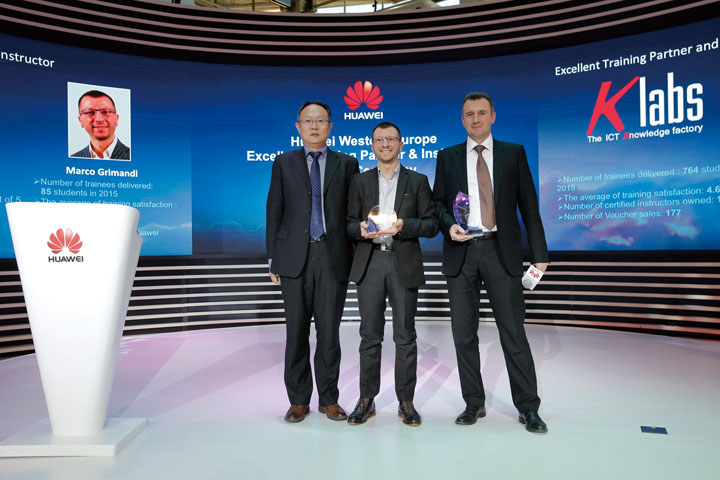K Labs: Fostering Talent with Huawei Training and Certifications
Enterprise products, solutions & services

K Labs specializes in telecommunications and ICT technical training, delivering both technology-independent and vendor certification courses. K Labs headquarters is in Italy, but the company delivers training in many other countries, providing delegate courses, including theoretical knowledge and practical experience. K Labs’s course catalog is available in four languages and includes more than 90 courses, focusing on the fields of data centers, cloud computing, IP networking, mobile and fixed access, 5G, performance testing, multimedia broadcasting, ICT security, big data, IoT, blockchain, and AI.
K Labs customers are mostly network operators, manufacturers, systems integrators, finance enterprises, governments, and utility companies.
K Labs delivers different types of Huawei certification training courses. In your opinion, why should an engineer consider getting a Huawei certification?
Well, Huawei is a multinational networking and telecommunications company that provides equipment and services to the global market. Today, it is not a challenge to invest in Huawei. It is certain that the ICT market will require more and more engineers able to build the future networks using Huawei equipment and solutions.
K Labs is an independent training organization. What do you think about the Huawei certifications compared to those of other vendors in terms of value and quality?
Huawei has got a dedicated team for training and certification that works at central and local levels. When I visited Huawei’s headquarters in China, I was impressed by how Huawei takes care of the training partner feedback to continuously improve the quality of the training and certifications. It is something that I have never seen from other vendors.
Regarding the quality, I can say that getting a Huawei certification does not mean just passing an exam. Huawei encourages the candidates to attend training before to take an exam. This gives great added value to Huawei certifications, because the certified engineers have really experienced installing, configuring, and managing Huawei equipment.
Compared to other vendors, Huawei better supports K Labs because it provides free certification vouchers for trainers and students, arranges “train the trainer” sessions, and supports K Labs with training labs and technical support teams.
K Labs is involved in training teachers and professors of colleges and universities who have become Huawei ICT Academy Partners in Europe. What do you think of the Huawei ICT Academy program? And why should a school or university be interested in this?
Engineers that want to face new ICT challenges should approach the job market with proper technology knowledge. Universities are doing a great job in providing such skills, but today that is not enough. Huawei ICT Academy program integrates the students’ skills with the emerging vendor technologies. This is a great opportunity for university students. In China, 40 percent of the students with the certification have been able to find jobs with better salaries. And, at the same time, for the universities, Huawei ICT Academy is an opportunity to provide a unique curriculum for students, getting students ready for employment.
The authorized learning partnership between Huawei and K Labs started over 12 years ago. How has the partnership evolved over the years, and what do you expect it will mean for K Labs in the future?
Yes, we have been working with Huawei since 2006. At that time, very few people knew who Huawei was, and K Labs was a small company. But Huawei and K Labs trusted each other, and we started a training cooperation with the Carrier Business Group and later with the Enterprise Business Group, growing together and setting up a real partnership.
Today, K Labs is the most important HALP in Western Europe, providing training on the entire Huawei training portfolio, including routing and switching, storage, cloud, data center, WLAN transmission, access, LTE, and 5G, and to prepare ICT engineers to pass HCIA, HCIP and HCIE certification exams.
Since we have been working as a HALP, we have trained more than 3,200 students in Western Europe.
Today, the Huawei brand is well known both in the consumer business for the smartphones and in the enterprise market. In fact, many engineers and students from universities can now implement cost effective and reliable Huawei solutions in the ICT industry.
That is what Huawei and K Labs have been doing over the last 12 years, and what we are going to do in the future for a long time.

Excellent Training Partner Award at CeBIT
I think the main strength of our company is represented by the pool of 18 instructors. All of them are K Labs employees and have got HCIP certification level. Seven of them are also HCIE.
They have very good skills in terms of using Huawei’s technologies, technical experience with the training lab, and remarkable communications abilities.
As the cooperation between Huawei and K Labs is expanding across several countries, multi-language capabilities are required. That’s why K Labs instructors are able to deliver the courses in five different languages.
Huawei and K Labs have in common the ability to invest in the new technologies, the first in developing technology solutions, the second in transferring the related knowledge to partners and customers.
Together, we want to understand better how the training market will evolve in the future, what the customers need, and share our experience with companies from other regions.
I am sure that together Huawei and K Labs will succeed in future technology challenges, like 5G, Big Data, IoT and AI.